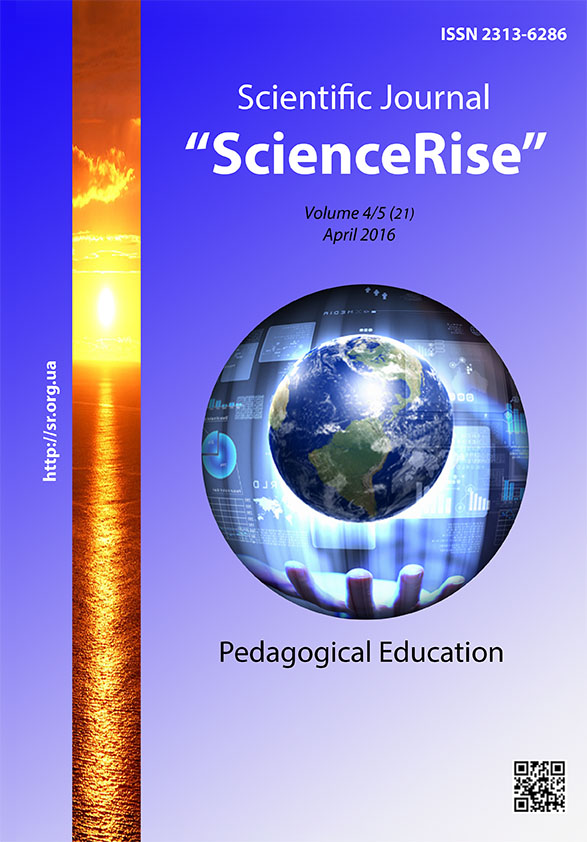Модель формування готовності майбутніх учителів початкових класів до застосування інноваційних технологій навчання математики в початковій школі
DOI:
https://doi.org/10.15587/2313-8416.2016.66351Ключові слова:
модель, моделювання, вчителі початкових класів, інноваційні технології, навчання математикиАнотація
У статті обґрунтовано актуальність моделювання навчального процесу у вищій школі, яке використовується для визначення педагогічних об’єктів і розробки педагогічних конструктів. Висвітлено структуру моделі формування готовності майбутніх учителів початкових класів до застосування інноваційних технологій навчання математики в школі. У розробленій моделі відображено взаємозв’язок таких блоків: організаційно-цільового, теоретично-змістового, діяльнісно-формувального, результативно-оцінювального
Посилання
Polonskij, V. M., Kraevskij, V. V. (2001). Metodologija dlja pedagoga: teorija i praktika. Volgograd: Peremena, 324.
Martynenko, S. M. (2009). Systema pidgotovky vchytelja pochatkovyh klasiv do diagnostychnoi' dijal'nosti. Kyiv, 384.
Mel'nychuk, I. M. (2011). Teorija i praktyka profesijnoi' pidgotovky majbutnih social'nyh pracivnykiv zasobamy interaktyvnyh tehnologij. Ternopil, 584.
Bahmat, N. V. (2011). Formuvannja gotovnosti majbutn'ogo vchytelja pochatkovyh klasiv do pedagogichnogo modeljuvannja. Kyiv, 20.
Demchenko, O. P. (2006). Formuvannja u majbutnih uchyteliv pochatkovyh klasiv profesijnoi' gotovnosti do stvorennja vyhovnyh sytuacij. Vinnycja, 259.
Lavrinenko, O. A. (2009). Pedagogichna majsternist' v istoryko-pedagogichnomu vymiri: teorija, praktyka, postup. Kyiv: Bogdanova A. M., 328.
Telychko, N. V. (2014). Teoretychni i metodychni zasady formuvannja osnov pedagogichnoi' majsternosti majbutnih uchyteliv pochatkovyh klasiv. Vinnycja, 559.
Busel, V. T. (Ed.) (2009). Velykyj tlumachnyj slovnyk suchasnoi' ukrai'ns'koi' movy. Kyiv; Irpin': VTF «Perun», 1736.
Navolokova, N. P. (2009). Encyklopedija pedagogichnyh tehnologij ta innovacij. Kharkiv: Vyd. grupa «Osnova», 176.
Kraevskij, V. V. (2003). Obshhie osnovy pedagogiki. Moscow: Izd. centr «Akademija», 256.
##submission.downloads##
Опубліковано
Номер
Розділ
Ліцензія
Авторське право (c) 2016 Оксана Миколаївна Ліба

Ця робота ліцензується відповідно до Creative Commons Attribution 4.0 International License.
Наше видання використовує положення про авторські права Creative Commons CC BY для журналів відкритого доступу.
Автори, які публікуються у цьому журналі, погоджуються з наступними умовами:
1. Автори залишають за собою право на авторство своєї роботи та передають журналу право першої публікації цієї роботи на умовах ліцензії Creative Commons CC BY, котра дозволяє іншим особам вільно розповсюджувати опубліковану роботу з обов'язковим посиланням на авторів оригінальної роботи та першу публікацію роботи у цьому журналі.
2. Автори мають право укладати самостійні додаткові угоди щодо неексклюзивного розповсюдження роботи у тому вигляді, в якому вона була опублікована цим журналом (наприклад, розміщувати роботу в електронному сховищі установи або публікувати у складі монографії), за умови збереження посилання на першу публікацію роботи у цьому журналі.

